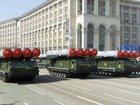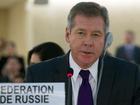Russia on Friday welcomed the British parliament's rejection of military action against the Syrian regime and warned that such an attack without U.N. approval would deal a major blow to the existing world order.
President Vladimir Putin's chief foreign policy aide Yury Ushakov said the British vote showed growing public understanding of the dangers of an attack against President Bashar Assad's regime.
 Full Story
Full Story
Russia opposes any United Nations Security Council resolution that would permit military strikes against the Syrian regime of President Bashar Assad, a senior diplomat said Friday.
"Russia opposes any resolution of the U.N. Security Council indicating the probability of the use of force, (or) any resolution that could be used for military action against Syria," Deputy Foreign Minister Gennady Gatilov told the ITAR-TASS news agency.
 Full Story
Full Story
A top Russian weapons maker said Thursday that the S-300 air defense missile systems made for Iran had been dismantled and disposed of following Western pressure to shelf the contract.
"The hardware that was destined for Iran no longer exists," general director of Russian weapons manufacturer Almaz-Antey Vladislav Menshchikov told reporters.
 Full Story
Full Story
Russian President Vladimir Putin and German Chancellor Angela Merkel agreed Thursday on the need for the U.N. Security Council to study a report by U.N. experts on the alleged chemical attack outside Damascus, the Kremlin said.
"Both sides proceed from the fact that active work will be continued within the framework of the United Nations and other formats on issues of a political and diplomatic settlement of the current situation," the Kremlin said in a statement.
 Full Story
Full Story
Russia "over the next few days" will be sending an anti-submarine ship and a missile cruiser to the Mediterranean as the West prepares for possible strikes against Syria, the Interfax news agency said on Thursday.
"The well-known situation shaping up in the eastern Mediterranean called for certain corrections to the make-up of the naval forces," a source in the Russian General Staff told Interfax.
 Full Story
Full Story
Western plans for retaliatory action against Syria for an alleged chemical weapons attack are "difficult to develop", the French government spokeswoman said Thursday.
"The international community must find a riposte that is adapted to the situation," Najat Vallaud-Belkacem said on France 2 television.
 Full Story
Full Story
Calls for a military intervention in Syria are an "undisguised challenge" to the United Nations charter, the Russian foreign ministry said Thursday.
"Declared plans by some states to inflict a military strike on Syria are an undisguised challenge to the key provisions of the U.N. charter and other norms of international law," the statement quoted deputy foreign minister Gennady Gatilov as telling U.N. Secretary General Ban Ki-moon at a meeting at The Hague on Wednesday.
 Full Story
Full Story
A resolution condemning Syria's alleged poison gas use has stalled in the U.N. Security Council due to Russian "intransigence," the United States said Wednesday.
"We see no avenue forward, given continued Russian opposition to any meaningful Council action on Syria," State Department deputy spokeswoman Marie Harf told reporters as Washington and Western allies mull a possible strike on Syria after last week's alleged chemical weapons attack by Syrian regime forces.
 Full Story
Full Story
Envoys from Britain, China, France, Russia and the United States held talks Wednesday on a British drafted U.N. Security Council resolution that could allow military action in Syria.
The meeting ended without any sign that the 15-nation Security Council could vote any time soon on a resolution condemning the use of chemical weapons in Syria.
 Full Story
Full Story
Russian police said Wednesday they had raided an exhibition and confiscated a painting that portrayed President Vladimir Putin and Prime Minister Dmitry Medvedev lounging together in women's lingerie.
Police said they confiscated four paintings by artist Konstantin Altunin and closed down the exhibition of his work in Russia's second city of Saint Petersburg, which is set to host world leaders for the G20 summit next month.
 Full Story
Full Story



